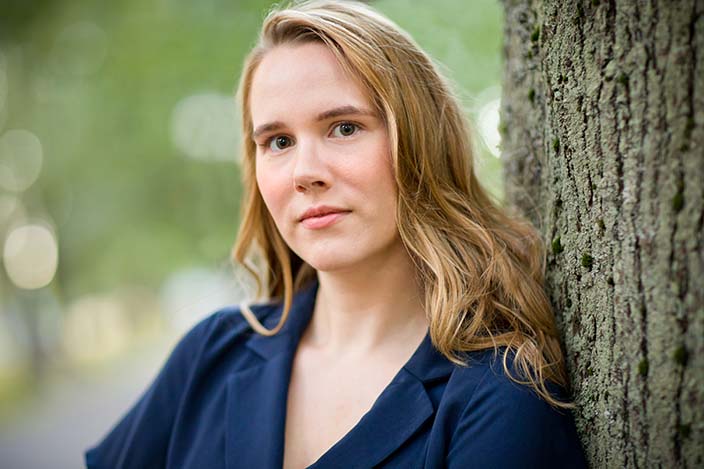It’s no surprise Amanda Leslie’s first stories were penned while camping in Fundy National Park. The 2021 winner of the Penguin Random House Canada Prize for best MFA nonfiction book proposal says Wild Places: Exploring Our Connection to Canada’s National Parks stems from a childhood full of camping trips with her family.
“I would just spend my days playing in tide pools, swimming in waterfalls, reading books on the sea floor when the tide would roll out. I remember laying on the beach with my little notebooks and just, you know, making up stories while I was there.”
The jury for the award recognized this three-time graduate of the University of King’s College, (BSc’13, BJ ‘14, and MFA’17) as having a unique perspective on Canada’s national parks. Kim Pittaway, the executive director of the Master of Fine Arts in Creative Nonfiction program, says the jury saw “…a real layering of narrative and historical background that goes into our park system, and it’s not just settler history or a guidebook.”

Amanda Leslie
Unable to cover every national park in Canada, Leslie features 12 of the 48, and represents the breadth of their physical diversity, from Gros Morne’s fjords, to flat Saskatchewan prairie at Grasslands, to the emerald-green waters of the lakes in Jasper.
What’s unique to the book are the personal narratives of individuals connected to each park. Whether they’re artists, First Nations elders, or new immigrants, Leslie says meeting them has deepened her appreciation for the parks and taken her in unexpected directions. She won’t soon forget being with Syrian refugees on a learn to camp program, describing it as a real ‘aha moment’ when she learned their only prior experience with tents was from refugee camps.
The story of any one of Canada’s national parks is multifaceted and changes with time. The chapter on Jasper National Park features the work of contemporary Indigenous artist Jason Carter, but much of it is focused on the summer of 1953 when Marilyn Monroe was filming River of No Return. And there have been dark moments, too. Through her research, Leslie also learned that some of Canada’s national parks housed prisoner-of-war camps in war time.
“You can’t tell the story of national parks without talking about mistakes that we’ve made in the past.” Leslie adds “There are reasons to be encouraged about our park system, but there are also truths about our park system that I think Canadians need to know.”
Since the inception of the MFA program at King’s in 2013, at least 35 students have published their work or entered into a publication contract. Penguin Random House Canada and Westwood Creative Artists have supported the program from the beginning and been part of the advisory board. The award comes with $2500 cash, an offer of representation from Westwood Creative Artists, and a meeting with an editor from Penguin Random House Canada.
Of the five finalists, Hilary McMahon, executive vice president of Westwood Creative Artists, says “it was a rich reading experience but a challenge to choose a winner.” She adds, “Amanda Leslie’s accessible, informed and engaged voice are a strong complement to the breadth and depth of her research.”
Leslie, who’s working on the final few chapters, says she wouldn’t have gone this far without the MFA. Interested in both science and journalism since she was young, she says the MFA opened her to the wonders of longform writing. She adds she knew when she came to King’s that she wanted to write about Canada’s national parks but wasn’t sure exactly where to focus. With the help of the program, hours of research, and time, she’s figured it out.
Praising both the program and her mentors, she says the award provides affirmation that her work of the past four years means something to others. “It’s a vote of confidence, “she says. “I feel like we toil away on these projects, and you’re never quite sure when you’re working on it, if other people are going to resonate with what you’re writing.”
As well as delving into the past, Leslie is examining the future. She’s excited by projects such as the one in Gross Morne, where they’ve built autism-friendly cabins and in Prince Edward Island National Park, where they offer two types of wheelchairs to help the physically challenged get on the beach and into the water. She also points to parks, like Gwaii Haanas National Park Reserve in B.C. and Thaidene Nene National Park Reserve in the Northwest Territories, which are co-managed by the federal government and the First Nations people who live on that land. Leslie believes this is positive and the right way to move forward.
Taking at least two more years than anticipated, she adds, writing the book has had numerous challenges. Travel mishaps, a close encounter with a calving elk, and a world-wide pandemic are now part of the backstory. But according to her “it’s just been such an adventure, that I wouldn’t change it for the world.”
Banner image: Bay of Fundy. Aconcagua, CC BY-SA 3.0, via Wikimedia Commons

